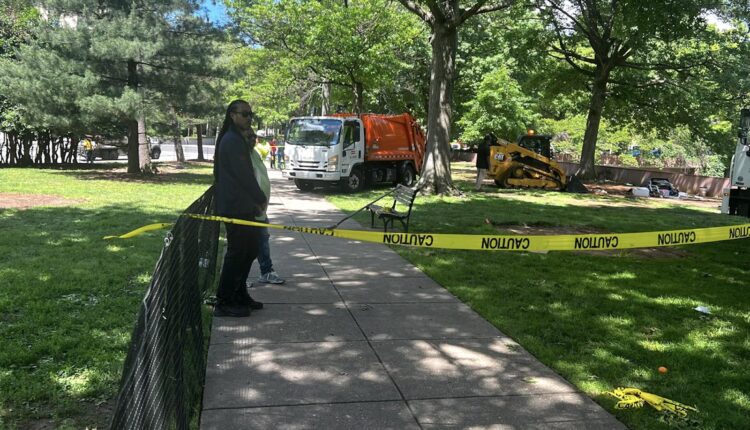
Lara Pukatch and Jesse Rabinowitz: Biden and Bowser’s encampment evictions push us farther away from solving homelessness
Despite their repeated public commitments to address the housing crisis that has left many without shelter in DC, the Biden administration and Mayor Muriel Bowser have evicted nearly 90 homeless individuals from their communities in Foggy Bottom in recent weeks. What’s more, many of the people who were displaced by these encampment clearings weren’t matched with housing even though hundreds of vouchers to house homeless people sit unused.

Recent data from the DC Department of Human Services shows a 14% rise in homelessness this year — including an 6% increase among single adults, those most likely to live in encampments. Yet, instead of tackling root causes or using available resources like the unused housing vouchers stalled by bureaucratic gridlock, the city has chosen eviction, worsening instability and perpetuating the homelessness cycle.
These evictions from federal and District land aren’t an isolated failure. Earlier instances, like the displacement from McPherson Square in February 2023 that resulted in the arrest of two homeless veterans and left dozens without shelter, foreshadowed today’s crisis. Displacing homeless individuals without addressing their needs is a superficial approach to deep systemic issues, providing only an illusory solution.
The timing of the most recent evictions is also concerning, especially as DC is on the cusp of opening a new shelter in the Foggy Bottom neighborhood and has unused housing vouchers that could help. Proceeding with evictions now risks pushing this vulnerable group further from the support they so deeply deserve.
This policy not only harms those it displaces, but also erodes trust with case managers and in government initiatives generally — just a few ways that evicting encampment residents makes homelessness worse. A Journal of the American Medical Association study shows that evicting homeless individuals without offering real alternatives can lead to detrimental health outcomes and even be fatal.
A pending Supreme Court case, Johnson v. Grants Pass, underscores the need for policies that prioritize humane solutions over punitive measures. Officials in the Oregon town of Grants Pass discussed the evictions from McPherson Square in their brief as justification for their extreme policies. The U.S. solicitor general, representing the Biden administration, referred to the McPherson eviction as the “gold standard” for managing homeless encampments. If displacing 50 people and arresting two homeless veterans is considered the “gold standard,” it’s clear we must reevaluate and demand a higher benchmark that genuinely addresses the needs of the homeless with compassion and efficacy.
It’s imperative that both the Biden and Bowser administrations stop these evictions and focus on providing housing and other proven solutions. For Mayor Bowser, this is a chance to truly align her actions with her stated commitment to solve homelessness. For the Biden administration, it’s an opportunity to fulfill the goals set by its own strategic plan to address rising rates of homelessness across the country.
To genuinely address homelessness in DC, we need a renewed commitment to foundational solutions that tackle the core issues. This includes building a city and a country where everybody has access to the housing they need to thrive, and the support they need to get and stay housed. It’s not too late to change direction and turn promises into real action. If our leaders are truly committed to resolving homelessness, now is the time to demonstrate it.
We urge the Biden administration and Mayor Bowser to fundamentally rethink their approach to homelessness. Instead of displacing residents, the District should halt all evictions until The Aston, a non-congregate shelter that was formerly a George Washington University residence hall, has opened and suitable solutions are provided for every encampment resident. It’s crucial to address the barriers that exist within DC’s larger shelter system, such as restrictive curfews and limits on possessions, and to increase the capacity of non-congregate shelters.
Our focus must shift from closing encampments to swiftly connecting residents with housing vouchers and funding essential programs that can actually end homelessness, including permanent supportive housing and street outreach. As it currently stands, DC’s fiscal year 2025 budget will end homelessness for only 43 individuals — a stark contrast to the 70 people impacted by recent encampment evictions, the 887 people living outside citywide, or the nearly 2,000 individuals in need of live-saving housing interventions.
Lara Pukatch is the chief advocacy officer at Miriam’s Kitchen. Jesse Rabinowitz is the campaigns and communications director at the National Homelessness Law Center.
About commentaries
The DC Line welcomes commentaries representing various viewpoints on local issues of concern, but the opinions expressed do not represent those of The DC Line. Submissions of up to 850 words may be sent to editor Chris Kain at chriskain@thedcline.org.


Comments are closed.